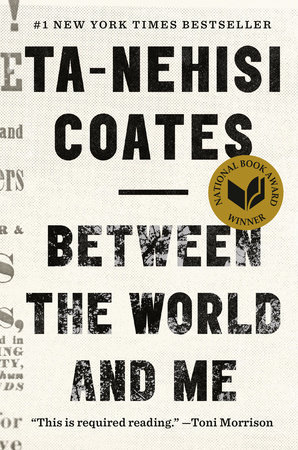In this testament, written as a letter to his teen-aged son, Ta-Nehisi Coates attempts to explain what the false construct of race determines, what being considered black entails, and what it means to live a country where slavery and segregation have created mass inequities. Certain learned scholars have taken issue with some of Coates’ theories while others have called him a genius. Most agree that his words demand attention and that he’s an incredibly nuanced and exceptional writer. His genius is now literally acknowledged as he was recently awarded a 2015 MacArthur “Genius” grant. Regardless of how we see him, his sentence construction, insight, and tenor make the uncomfortable subject of race impossible to ignore.
In the early pages of the book, he notes, “I propose to take our countrymen’s claims of American exceptionalism seriously, which is to say I propose subjecting our country to an exceptional moral standard.” He then addresses his son,
“I write you in your fifteenth year. I am writing you because this is the year you saw Eric Garner choked to death for selling cigarettes; because you know now that Renisha McBride was shot for seeking help, that John Crawford was shot for browsing in a department store. . . And you know now if you did not before, that the police departments of your country have been endowed with the authority to destroy your body. . . Turn into a dark stairwell and your body can be destroyed. The destroyers will rarely be held accountable. Mostly they will receive pensions.”
Some readers may wonder if Coates illuminates the problem too much; I assure you he does not, because his passion for the subject and his deep love for his son seize your attention and your heart. When Coates continues, his evocative words force the reader to look deeper.
“Here is what I would like for you to know: In America, it is traditional to destroy the black body – it is heritage. Enslavement was not merely the antiseptic borrowing of labor – it is not so easy to get a human being to commit their body against its own elemental interest. And so enslavement must be casual wrath and random manglings, the gashing heads and brains blown out over the river as the body seeks to escape. It must be rape so regular as to be industrial. There is no uplifting way to say this. I have no praise anthems, nor old Negro spirituals. The spirit and soul are the body and brain, which are destructible -- that is precisely why they are so precious. And the soul did not escape. The spirit did not steal away on gospel wings. The soul was the body that fed the tobacco, and the spirit was the blood that watered the cotton, and these created the first fruits of the American garden. And the fruits were secured through the bashing of children with stovewood, through hot iron peeling skin away like husk from corn.”
The Atlantic where Coates is a national correspondent published an adaptation/excerpt from the book that I almost guarantee will make you buy the book. It has also devoted space in numerous issues to thoughts on this book. After you finish reading Between the World and Me, you may want to read these thoughts as I suspect that you, like I, will have had many conflicting thoughts as you wound your way through the book and seeing that others, too, were conflicted, will help you process this book that absolutely demands a second and probably at least a third reading. Also remember, as you read, that this book grew out of love:
“I love you, and I love the world, and I love it more with every new inch I discover. But you are a black boy, and you must be responsible for your body in a way that other boys cannot know. Indeed, you must be responsible for the worst actions of other black bodies, which, somehow, will always be assigned to you. And you must be responsible for the bodies of the powerful – the policeman who cracks you with a nightstick will quickly find his excuse in your furtive movements.”
Summing it Up: I agree with Toni Morrison’s take on this book: “This is required reading.” Read it, then share it with others so you can talk about what we can do to hold ourselves to an exceptional moral standard. Coates doesn’t offer answers to how we solve this dilemma and that may frustrate readers. I’m grateful that he addresses our problems first and I hope that in forthcoming writing he’ll suggest solutions.
Note: Between the World and Me is on the long list for the National Book Award and is a finalist for the Kirkus Prize.
Rating: 5 stars
Category: Five Stars, Gourmet, Nonfiction, Super Nutrition, Book Club
Publication date: July 8, 2015
Read an Excerpt/Adaptation: http://www.theatlantic.com/politics/archive/2015/07/tanehisi-coates-between-the-world-and-me/397619/
Interview with the Author: http://www.npr.org/2015/07/13/422554778/ta-nehisi-coates-on-police-brutality-the-confederate-flag-and-forgiveness
The Atlantic Book Club Reader Responses: http://www.theatlantic.com/national/archive/2015/07/readers-critical-between-world-me-ta-nehisi-coates/399641/
What Others are Saying:
The Atlantic: http://www.theatlantic.com/politics/archive/2015/07/james-baldwin-tanehisi-coates/399413/n (This includes links to numerous other comments and reviews.)
Kirkus Reviews: https://www.kirkusreviews.com/book-reviews/ta-nehisi-coates/between-the-world-and-me/

No comments:
Post a Comment